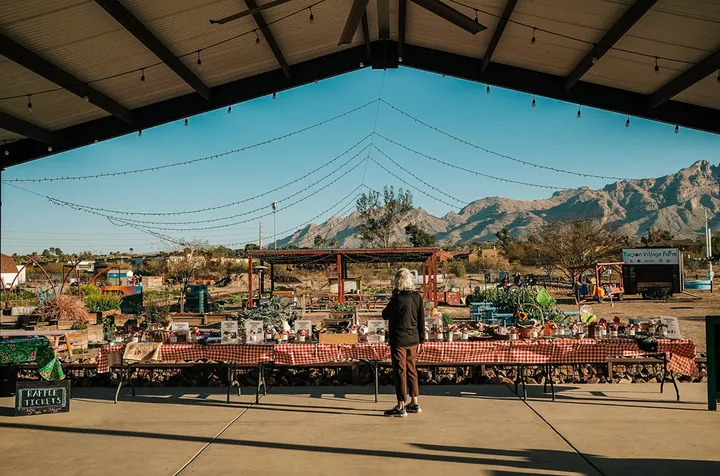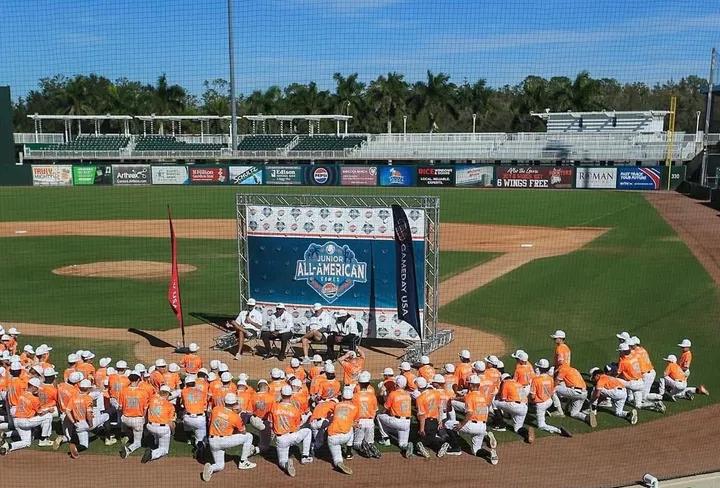Jon Proudstar talks Native storytelling at Pima library event
At a Pima County Library event, actor and writer Jon Proudstar spoke about Indigenous storytelling, media representation, and his comic series “Tribal Force.”
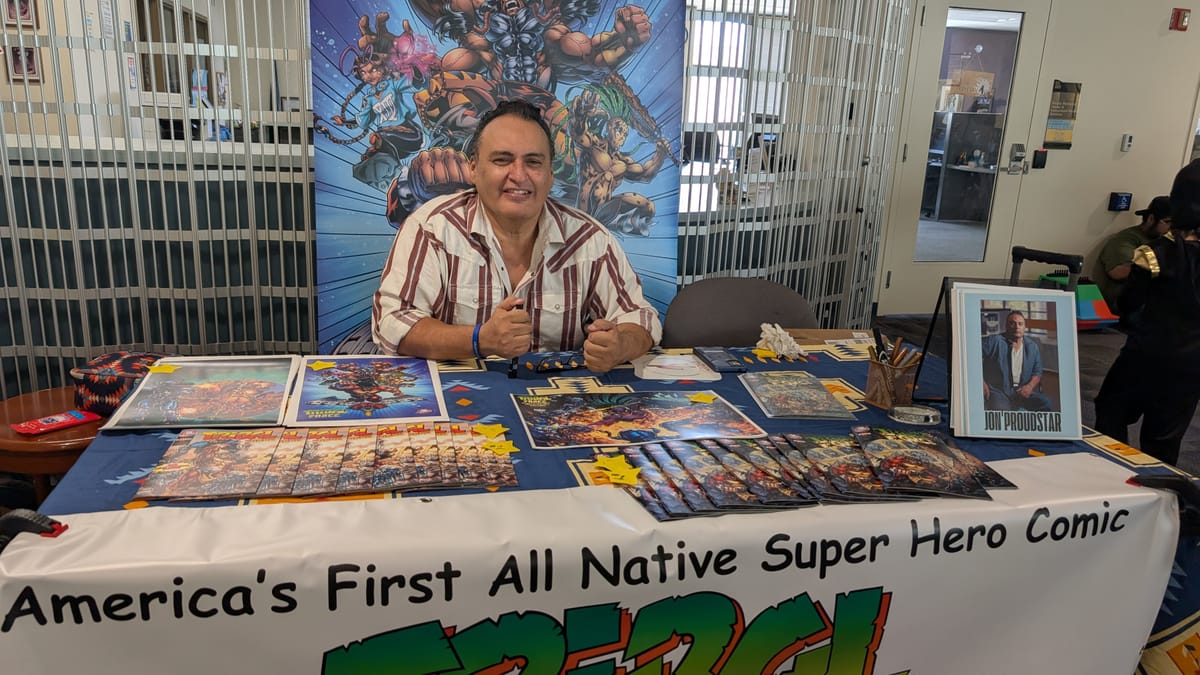
At a Tucson comic and culture event earlier this month, Native actor and writer Jon Proudstar spoke candidly about using his revived comic series “Tribal Force” to confront sexual violence, suicide and generational trauma on Native reservations, turning pain into storytelling that offers kids heroes they can relate to.
Proudstar was a speaker at Pima County Library’s Mega Mania event, talking about Indigenous storytelling and representation in the media.
His session was presented by the library's Many Nations Team, which aims to provide literary outreach to Native communities in the county.
His friendly demeanor and relaxed confidence showed no hint that he has co-starred alongside actors like Val Kilmer, Chuck Norris and Wes Studi.
“Tribal Force” is the first-ever all-Native American cast of superheroes, created by Proudstar and initially released in 1996 by Mystic Comics.
The company only published one issue, going out of business shortly after, but the comic book was revived a few years ago, after a friend from the old publishing company reached out to Proudstar to let him know he was back in the business.
The two, along with illustrator Chris Williams, went on to produce a second issue of “Tribal Force,” with a third in production.
Proudstar, a member of the Pascua Yaqui Tribe, is known for his acting role as Leon on the TV series "Reservation Dogs," and his roles in films including “Geronimo,” “Billy the Kid,” “Year of the Dog” and more.
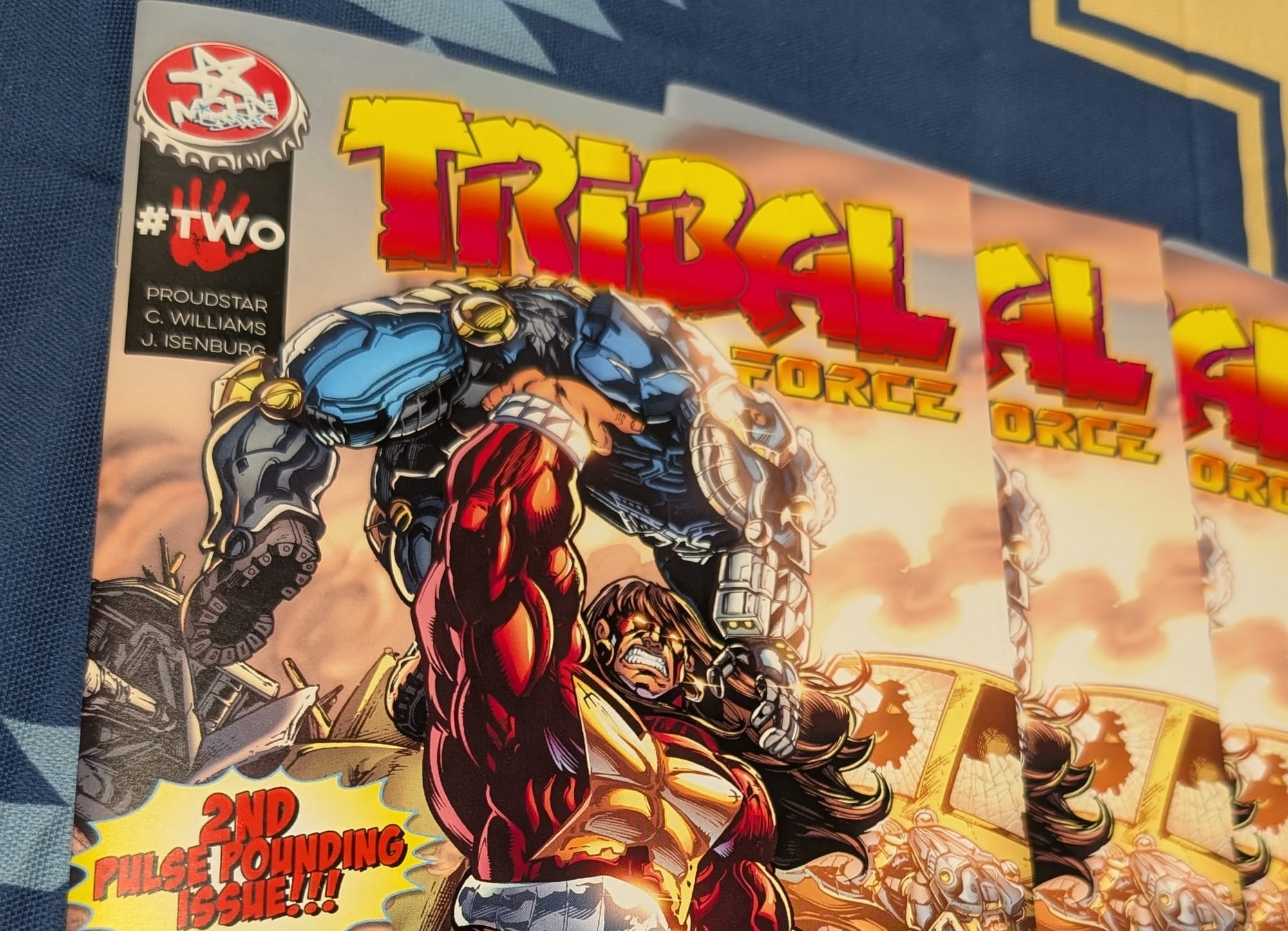
Proudstar’s inspiration for “Tribal Force” comes from many parts of his life, but the 34 years he has spent working with survivors and perpetrators of sexual violence plays a central role.
Nita, the hero, is a survivor of molestation, and the other main character, Gabe, is a violent youth offender. The juxtaposition reveals parts of life on the reservations that Proudstar said are not talked about and often ignored.
“One year, we had seven suicides on the reservation, and the majority of them were connected to molestation and nobody did anything. There was no prosecution, there was nothing. Nothing was done,” Proudstar told Mega Mixer attendees. “I created the book to shed light on what’s happening on reservations. Seven out of 10 girls will experience some form of molestation or violence in their lifetime.”
Proudstar said he created main characters Nita and Gabe to give the kids he worked with heroes they could relate to.
A 2019 study published in “Child Abuse and Neglect” found significant evidence that childhood sexual abuse is linked to a higher risk of later sexual offending.
Research has also shown that sexual abuse was widespread at boarding schools for Indigenous students. Without support or acknowledgment, the trauma followed survivors home, fueling a cycle of abuse within families that had once been loving and protective.
“It’s important that we expose what’s going on within the native community,” Proudstar said. “Some people are like, ‘Dude, that’s a heavy subject for a comic book.’ I don’t care. This is the only way I know how to combat it…with the skill set I have.”
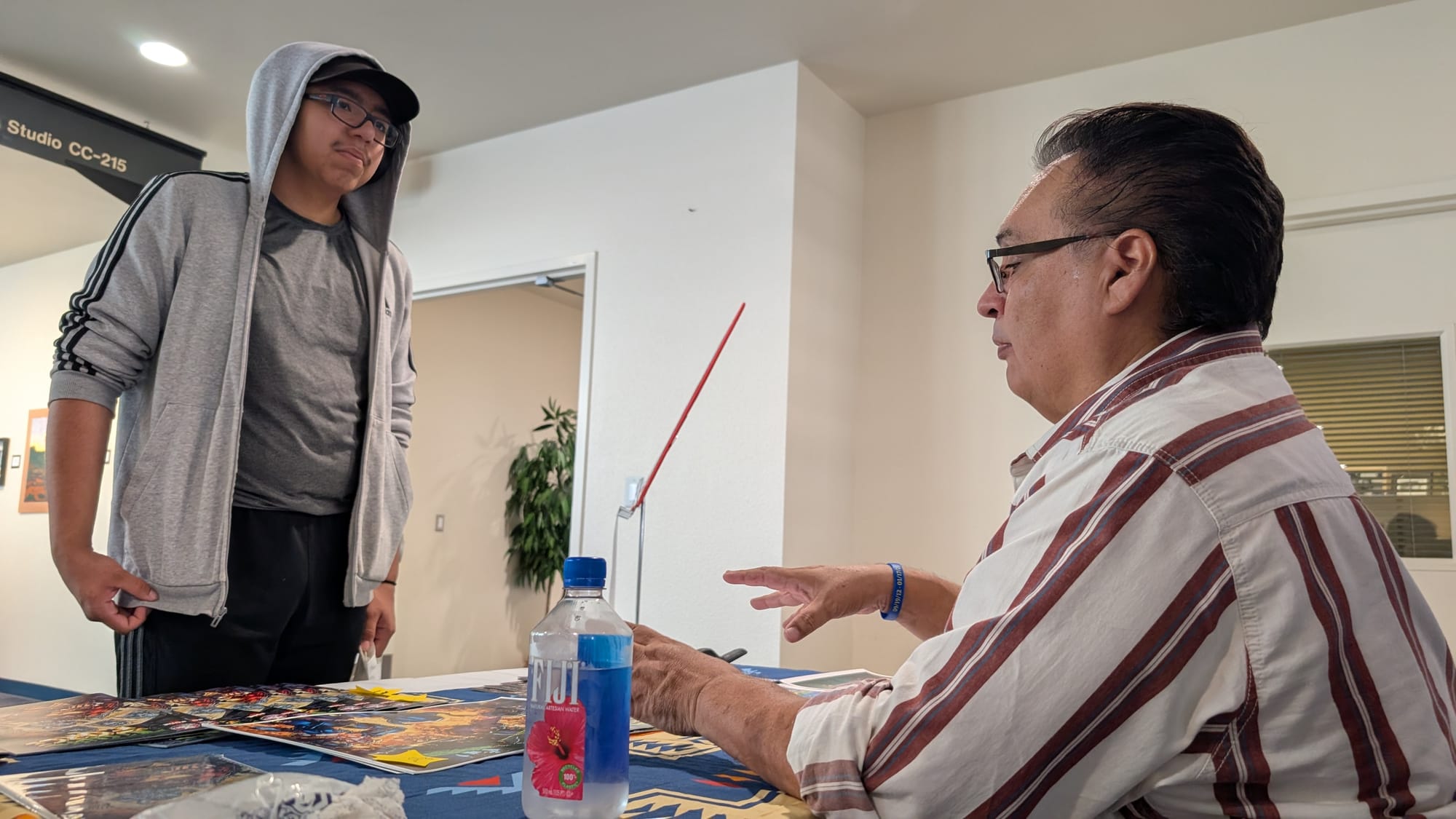
Proudstar also prides himself on his honest depiction of Native people. He believes that showing the caring and humorous side of Native culture is essential to breaking down stereotypes.
“People just want to see the darkest side of the reservation, right? I’m not saying it doesn’t exist, obviously it’s there. But it’s not the complete picture,” he said. “‘Reservation Dogs’ showed that human part of us and that’s the same thing I want to show with ‘Tribal Force.’ Since the dawn of cinema, they never showed that side of us, the funny side, the caring parents.”
Proudstar said Disney and Hulu showed faith in “Reservation Dogs” by backing a show written for those who understand life on today’s reservations. He knew Native audiences would connect with it, even if non-Natives might be confused. Fans often message him with questions like, “What is skoden?” or “Why do you guys do this or that?”
“We are the most misunderstood race in this country and it was so cool to see us in a contemporary way. (‘Reservation Dogs’) showed this other side to us that we deal with our trauma through humor,” Proudstar said. “We aren’t these angry, alcoholic, violent… depressed human beings living in this depressed area called the reservation.”
He feels the same way about “Tribal Force,” viewing it as an introduction to the human side of Indigenous people.
More importantly, he believes it’s time to confront the history that led to these struggles.
“There’s only two representations of us. There’s the old one where we were these incredible warriors and civilizations, and then the downtrodden rez people. There’s this massive gap,” he said. “Unfortunately, it becomes very political because it's the government that did this to us. They broke every single treaty that they made with us. They tried to eradicate us. They tried to, you know, commit genocide then they failed. But this is the byproduct of genocide and of breaking those treaties. … This is an amazing country but we’re not going to get there if they continually hide this [history] right?”
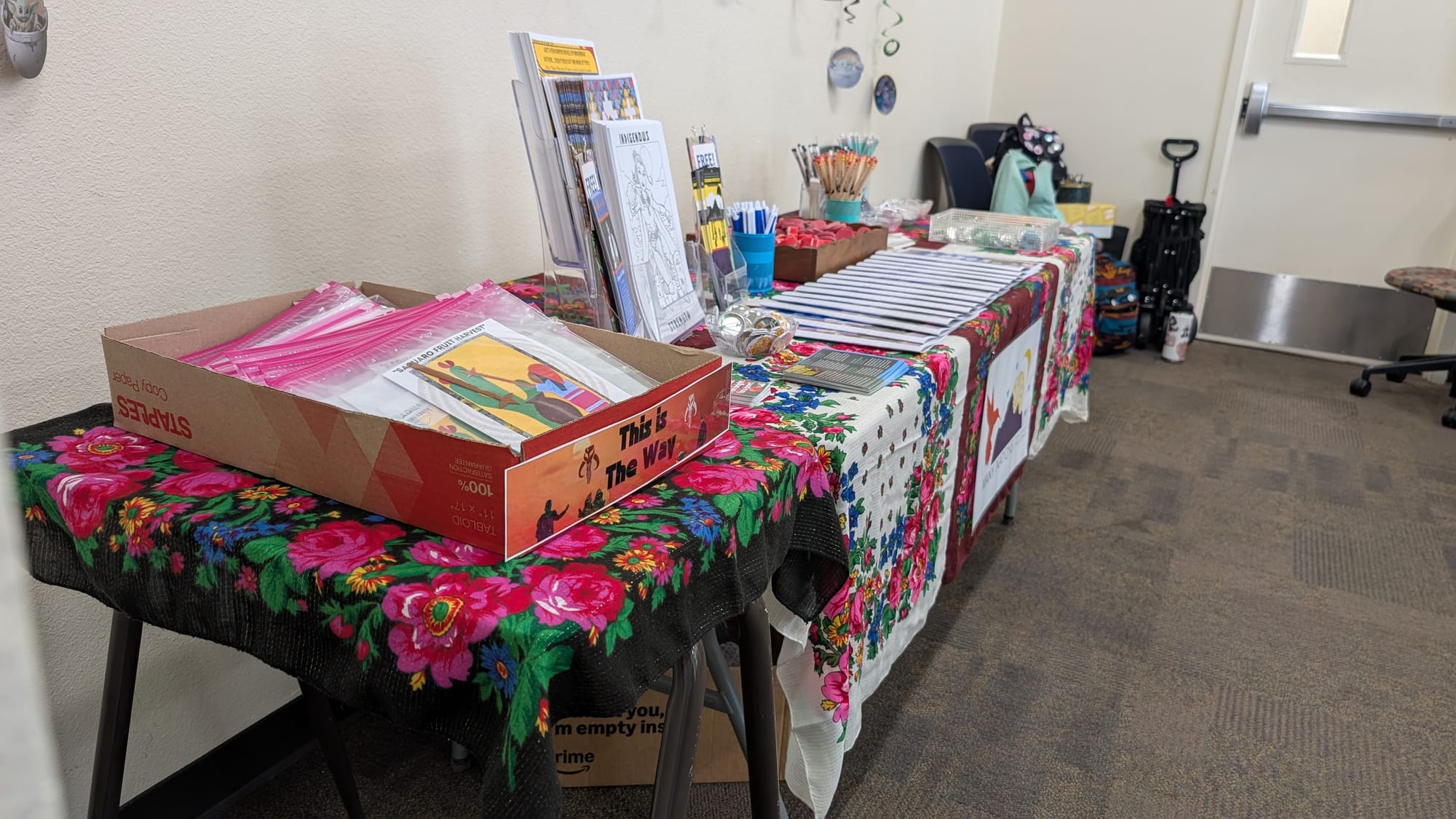
Proudstar said he wasn’t a strong student, but his love of comic books had him reading at advanced levels, surprising both his parents and teachers. His experience showed him that comics can be a powerful tool to reach kids and teach them about important issues.
“Our native kids are going through this tremendous responsibility that, ‘Oh my God, our culture has (been) put on us, we have to save it. We have to save our language,’” he said. “It’s that sense of responsibility that our native kids are feeling because they’re walking in two worlds.”
He said that kids who live on the reservation are grounded in reality, learning the value of money at an early age. Despite circumstances of scarcity on the reservations, people care for one another, even if the outside world views it differently.
Proudstar didn’t know he was Native American until a family member told him when he was around 5 years old. His family refused to believe it until his mother revealed the truth on her deathbed. Hiding Indigenous roots was a means of survival a generation or two ago.
Since learning the truth, Proudstar has embraced his identity wholeheartedly, saying that he tries to live in the Native way.
“We natives don’t believe in being above anyone else,” he said.
It’s a core belief in Native culture. Indigenous people carry an understanding of the universe’s interconnectedness, so the idea of being ‘above’ another person or life form doesn’t align with their worldview.
Back at Proudstar’s signing table, a patron was excited to pick up the second issue of “Tribal Force,” telling him that in addition to the artwork and first book’s cliffhanger, she was drawn to the lead character, Nita.
“I want my characters to be flawed. The kids that are reading this they see themselves in Nita or Gabe…, and instead of choosing suicide they can see that, ‘Oh look they’re going through something,’” Proudstar said during his talk. “Hopefully it’ll enthuse them to maybe talk to a counselor or somebody. It’s a lofty goal for a comic book, I know but it’s my hope.”
Katherine Martinez is a a Kickapoo-Potawatomi Native majoring in journalism at the University of Arizona and Tucson Spotlight intern. Contact her at martinezk29@arizona.edu.
Tucson Spotlight is a community-based newsroom that provides paid opportunities for students and rising journalists in Southern Arizona. Please support our work with a paid subscription.

